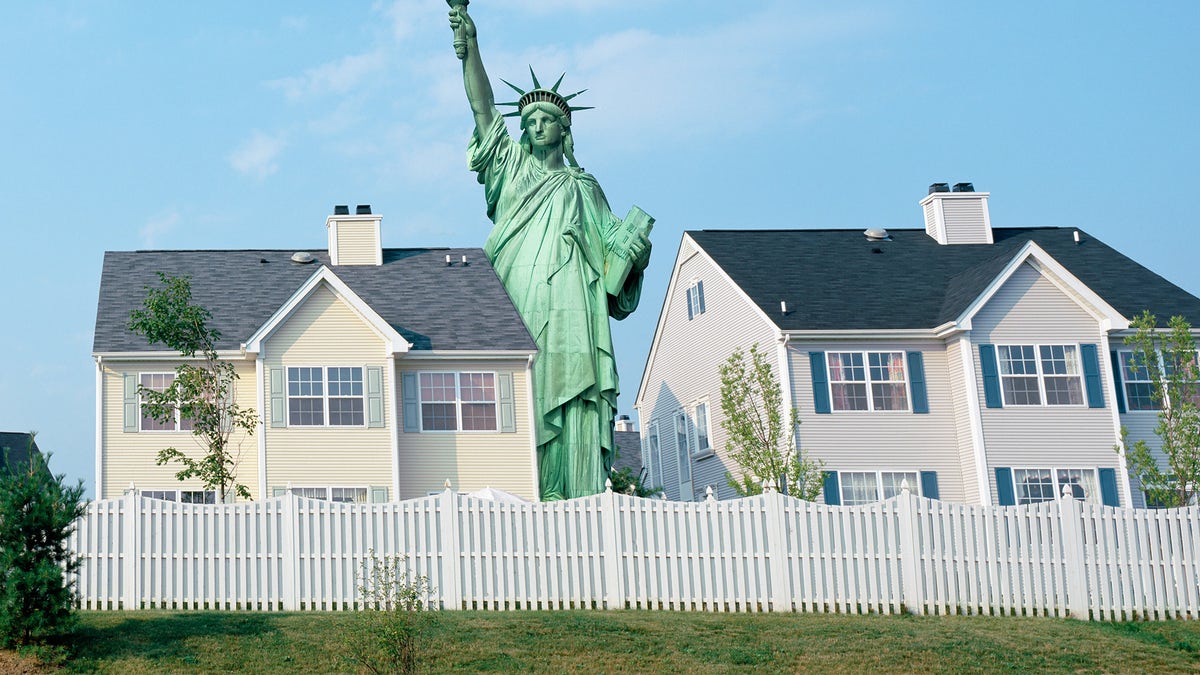
statue-suburbs
Longtime New York City residents like me pretty much exist in a permanent state of sticker shock -- the price of living in what we consider the greatest city in the world. Yet even those of us who are squeezed into one- or two-bedroom apartments with little possibility of upgrading, find ourselves frequently scouring the pages of realtor.com.
We are looking for homes in -- heaven forbid! -- the suburbs.
By some measures, more than 50% of Americans live in the suburbs. But these mysterious residential areas puzzle and sometimes even alarm many of us urban dwellers. Freestanding homes! Lawns! Driving! Strip malls! How can we possibly get up to speed?
Welcome to the move-to-the-suburbs class.
I went to one called "Beyond Brooklyn" a couple of weeks ago. It was sponsored by Warren Lewis Sotheby's International Realty and featured real estate agents from the four corners of New York City's suburbs: Essex County, NJ; Westchester County, NY; Nassau County, NY (aka Long Island); and Fairfield County, CT.
The event took place in a historic building in Park Slope. There were decadent pastries and glasses of red wine (because in Brooklyn, nobody has to drive home afterward). The attendees were mostly Gen Xers, with a smattering of Ys: the requisite dad wearing a baby carrier, and women in the nearly ubiquitous thong-style Birkenstocks.
The Realtors, a coalition of women in expensive dresses, tailored their pitches to us Brooklynites; every single one of them used the word "foodie" in their presentations. One announced by way of a lure, "We even have food trucks now."
First up was Essex County, part of the "Brooklyn Triangle": Maplewood, Glen Ridge, and Montclair, which seem to have a direct pipeline from Park Slope. Realtor Elizabeth Ruvo explained basics: the 45-minute commute by bus or train to Penn Station (the same as my commute to Midtown). The cost: a 40-trip pass for the bus is $280, and a monthly train pass is $208.
She extolled the highway access, the proximity to malls, and the car washes. Fearing car culture, New Yorkers? "You don't even have to pump your own gas in New Jersey."
But she also noted the walkability, the parks, the nationally renowned art museum, and, yes, the restaurants. "I hear brunch is a big thing here," she said. "You'll have lots of brunch options."
It's true. We are concerned with food, culture, and ease of access to the city. "You can't underestimate the power of commutability," said Realtor Lisa Sangster in her Westchester presentation. Most of the presenters somehow touched on the "D issue" (diversity). "You name the ethnicity, we've got it," says Gigi Bazarian, the Realtor from Fairfield County. But: "You might have to drive a bit to get to it."
It's not that New Yorkers don't move to the suburbs. We do! According to a 2012 report by the city, 21.1% of those who leave New York City move elsewhere in the state, including the suburbs. New Jersey is the next most popular destination, with 13.3%.
When the Connecticut Realtor Bazarian told us, "I have the luxury of being able to say to my kids, 'Go out and play,'" you could practically feel the envy among the city-locked crowd. As for the anxiety of leaving our communities and our loved ones? "Your friends will visit you," she said.
So, if it's such heaven, then why are so many New Yorkers both on the fence about and overwhelmed by the prospect of it?
Suburban Jungle Realty, which started in New York and now has offices in the pricey metropolises of Los Angeles, Miami, San Francisco, and Chicago, has been answering that question since it started in 2008.
It, too, holds move-to-the-suburbs seminars, titled "NYC, Should I Stay or Should I Go?" Its latest one, in May, was hosted by Ryan Serhant, NYC real estate broker and one of the stars of Bravo's " Million Dollar Listing," and Alison Bernstein, founder of Suburban Jungle.
"The process of figuring out whether to leave the city and where to go was really inefficient and overwhelming," Bernstein said. Each agent in her business acts as a "personal strategist," first helping clients home in on the town that'll make them the happiest; the house comes next. Almost every one of her attendees, she said, becomes a client.
Back at the Beyond Brooklyn event, we eagerly awaited the skinny on our most pressing concern: property taxes. Although Ruvo said you could get a four-bedroom house in Maplewood with $15,000 in taxes, I look obsessively at our site's Maplewood listings. Any house I like has taxes over $17,000, and most of them are $21,000. In Westchester County, the taxes might even be higher.
But each Realtor extolled the high-quality public schools in the suburbs -- and excused the exorbitant taxes because of them. "It's cheaper than private school" was a common refrain.
And guess what else the suburbs have? Bidding wars. "We don't have enough homes to fit everybody," Ruvo admitted. "You're seeing a lot of things going over list." Cue the desperation.
So did the class change anyone's mind or tell them anything they didn't already know?
Several people told me that it helped immensely. Many had never considered Long Island until they heard the presentation on Huntington, NY, with its hiking trails, farm stands, and kid-friendly beaches.
Bernstein found there's one consistent deal breaker for potential transplants: If you don't want to drive, forget it.
"As walkable as a suburb may be, urban living is urban living," she said. "You will be in your car, running errands. That part is never going to change."
Those of us who could get past the driving thing were standing there with our wine and pastries, trying to imagine ourselves in these comfy environments, with the malls and the driveways and the community pools. As Sangster told us, "You'll get used to it. And then you'll like it."